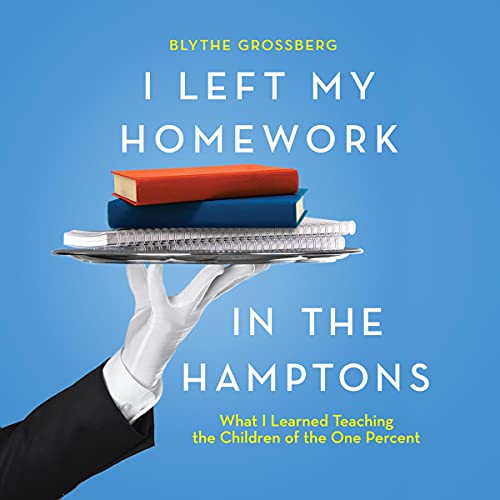I Left My Homework in the Hamptons
Full Title: I Left My Homework in the Hamptons: What I Learned Teaching the Children of the One Percent
Author / Editor: Blythe Grossberg
Publisher: HarperAudio, 2021
Review © Metapsychology Vol. 25, No. 36
Reviewer: Christian Perring
Blythe Grossberg acted as a private Manhattan tutor to rich children for many years. They attended expensive private schools. Many of them live a lifestyle that Grossberg compares to that of the Great Gatsby. She comes to understand that their days and nights are so crammed full of activities, the young people are under a great deal of pressure to achieve. She manages to both convey how sheltered they are from the realities that other kids their age experience. She also compares their family lives with her own. She grew up in middle class rural Massachusetts and lives outside of Manhattan, in Brooklyn or Queens.
Grossberg conveys her experience by making composite characters of students and their parents. She writes as if these students are real people but clearly she has assured that no student could recognize themselves from her descriptions. It is a device that works well. The book is well written, as one might expect from someone who spends a great deal of time examining great literature and telling students how to write well.
While the young rich may have just as many problems as middle class kids, they do tend to go on to become rich and powerful themselves. The wealthy Manhattanites may tend to vote Democrat, but they are not keen to achieve a real redistribution of power in society. They still make sure that their children go to the most prestigious universities, either by schooling or by making large donations. They know very well how to work the system, and get their children out of trouble if they behave badly. Parents of kids in public school rarely have the ability to threaten to lawyer-up when their children are sent to the principal.
The rich parents come out worst in Grossberg’s account, often ruthless in their ambitions for their children, even when this causes their children to be miserable. These parents are often too busy to spend much time with their kids. They employ a small army of helpers to manage their families. They treat their employees badly, sometimes not even paying them. Of course, there are exceptions, parents who are conscientious, empathetic and kind, but this seems to be a rarity.
While the lives of the One Percent in Manhattan (or even more so, the 0.5 Percent) are extraordinarily privileged, I Left My Homework in the Hamptons makes it clear that they don’t seem much happier than the middle class. Their children’s lives are full of amazing experiences in visiting all sorts of exotic places, but they are also very sheltered and, indeed, rather shallow. Getting rich and staying rich, and keeping up one’s social status can take a lot of work. Grossberg’s account doesn’t make the reader envy their lives. But it does make it clear how class divisions get entrenched in the USA.
This is a book I found particularly compelling and insightful. Grossberg pulls her punches and never writes as if she were involved in undercover work with the ultra-rich. She benefitted from her employment with these families as a private tutor, and she was grateful for that. She treats her subjects with respect. She really liked some of the students she taught. Nevertheless, it seems like their lives are very devoted to maintaining their status, which is essentially something of little worth or meaning.
The performance of the audiobook by Ann Marie Gideon is strong and full of energy.
Christian Perring is editor of Metapsychology Online.
Categories: Memoir
Keywords: wealth, class, education

